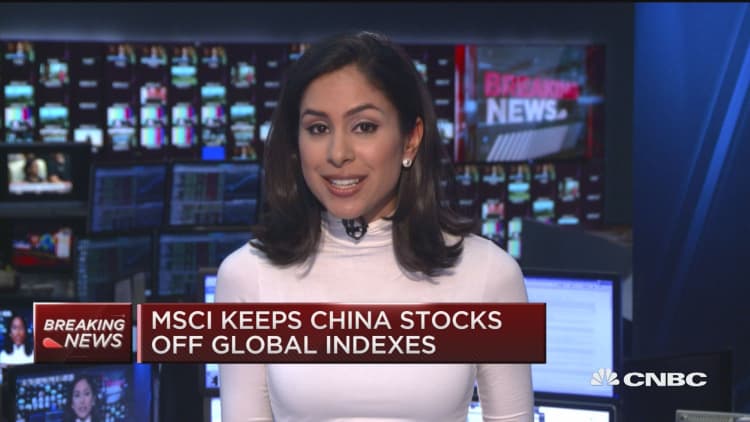
Major stock index firm MSCI said Tuesday it would delay inclusion of the mainland-traded Chinese A shares in its key emerging market index given lingering concerns about market accessibility.
"This could be a good thing, because it gives China incentive to push reforms through further rather than give them the benefit of the doubt," said Lucy Qiu, emerging market strategist at UBS Wealth Management.
Among issues that must be addressed, MSCI said in a release the 20 percent monthly repatriation limit remained a "significant hurdle" for investors.
"Chinese authorities have been trying to attract capital in, but restricting outflows, and this (repatriation limit) is capital restriction out. That does deter a lot of foreign investors," Qiu said, noting that "if the global environment remains benign and the currency depreciation remains gradual, they could actually consider relaxing it."
MSCI said it would retain the China A shares inclusion proposal as part of the 2017 review and did not rule out a potential off-cycle announcement "should further significant positive developments occur ahead of June 2017."
"International institutional investors clearly indicated that they would like to see further improvements in the accessibility of the China A shares market before its inclusion in the MSCI Emerging Markets Index," Remy Briand, managing director and global head of research at MSCI, said in the release. "In keeping with its standard practice, MSCI will monitor the implementation of the recently announced policy changes and will seek feedback from market participants."
The release also said investors needed more time to assess the effectiveness of the Qualified Foreign Institutional Investor program (QFII) investment quota allocation, capital mobility policy changes and the effectiveness of the new trading suspension policies.
"It appears the changes, while they have occurred, are too recent," said Chris Johnson, vice president of ETF sales and strategy at Macquarie in New York.
Last year, MSCI rejected the Chinese shares given concerns about market accessibility, liquidity and share ownership. The mainland Chinese stocks have had high volatility since then, including stock suspensions last summer and a circuit breaker fiasco in January. The Shanghai composite is down more than 40 percent over the last 12 months.
Chinese regulators in the last few months stepped up efforts to address many of those concerns, including a late May announcement by the Shanghai and Shenzhen stock exchanges of revised rules to limit stock suspensions. Analysts from firms such as Goldman Sachs recently increased their expectations that MSCI would have a favorable decision Tuesday.
MSCI did note Tuesday Chinese authorities have made "significant improvements" in accessibility for global investors.
"It's basically painted a fairly positive picture on the Chinese market, but it's not quite there for broad foreign investment," Johnson said.
The Deutsche X-trackers Harvest CSI 300 China A-Shares ETF (ASHR) traded more than 2 percent lower in after-hours trade. The iShares MSCI Emerging Markets ETF (EEM) was unchanged.
Without the A shares, the Chinese stocks listed in MSCI's emerging market index are all traded in either Hong Kong or the United States. That means the world's second-largest economy makes up only about one-fourth of the benchmark index, while projected full inclusion of A shares would bring that ratio to more than one third.
With about $1.5 trillion in assets under management tracking the index, China is keen to tap those funds as foreign investors search for returns outside their home markets.
To be sure, MSCI has said any inclusion would not be implemented immediately, and initial weighting of China A shares would be just 1.1 percent of the emerging market index.
"My hope was the MSCI decision would almost require asset managers and money managers to garner a better understanding of what's taking place in China," said Brendan Ahern, chief investment officer at China ETF provider KraneShares. "It's always a question of when and not if. It's just disappointing some of those misperceptions might persist until MSCI requires investors to ... do the due diligence that's required to invest."


